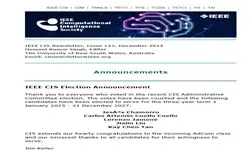PANEL Can AI Craft AI Inspired by the Brain?: Insights from the Fathers
Hiroshi Yamakawa, The Whole Brain Architecture Initiative, Japan; Kunihiko Fukushima, Fuzzy Logic Systems Institute, Japan; Shunichi Amari, Teikyo University, Japan; Shiro Takagi, AutoRes, Japan
-
Members: FreeCIS
IEEE Members: Free
Non-members: FreeLength: 02:00:16
03 Jul 2024
"Hiroshi Yamakawa, The Whole Brain Architecture Initiative, Japan; Kunihiko Fukushima, Fuzzy Logic Systems Institute, Japan; Shunichi Amari, Teikyo University, Japan; Shiro Takagi, AutoRes, Japan
ABSTRACT: In recent years, neural network research has seen remarkable development of Transformer-based models, including large-scale language models, basic models, and generative AI. However, current technological advances may be approaching their limits, and it remains to be seen whether the realization of advanced AI, such as Artificial General Intelligence (AGI), is possible using only existing methods. This may be partly due to the inability to rapidly expand the readily available data.
This panel invites two pioneers in neural network-based AI to explore whether insights from neuroscience can be incorporated into future AI research. The session will begin with a talk by Kunihiko Fukushima. He will discuss lessons learned from AI and its contributions to the technology behind deep learning. Shiro Takagi will then talk about the current state of the art in this field and present the current state and potential of AI research conducted by AI itself. In addition, Shunichi Amari, author of "The New Era of AI," will address a wide range of topics related to evolving AI research in light of the rapid progress of A
The panel discussion will delve into AI's impact on AI researchers' work and the evolution of AI research methods. Through this discussion, we aim to explore AI's future of AI research and humans' evolving role in this research domain. Ultimately, this panel discussion will provide valuable insights to the participants and catalyze specific action plans and new research directions for the future of AI research.


